Exploring Knowledge Sharing in Audits: An Article Annotation
VerifiedAdded on 2023/06/03
|10
|1928
|389
AI Summary
This article annotation delves into a study exploring the extent and determinants of knowledge sharing within audit engagements. The original study used data from auditors at two Big Four firms, revealing high but incomplete levels of knowledge sharing. Factors influencing this sharing range from client characteristics to attributes of the audit firm, team, and individual auditors. The annotation summarizes the study's purpose, which is to understand how knowledge sharing impacts audit effectiveness and efficiency. It identifies the study's audience as auditing firms and future researchers. Key concepts like auditing, knowledge sharing, audit efficiency, and effectiveness are defined. The annotation also highlights the evidence used, the study's limitations, and the authors' viewpoint on organizational, team, and auditor-level determinants. The conclusion emphasizes that knowledge sharing enhances audit service quality, and barriers should be addressed. The analysis concludes with personal reactions, strengths, and an evaluation of the article's quality and relevance. Desklib provides access to this and other solved assignments.
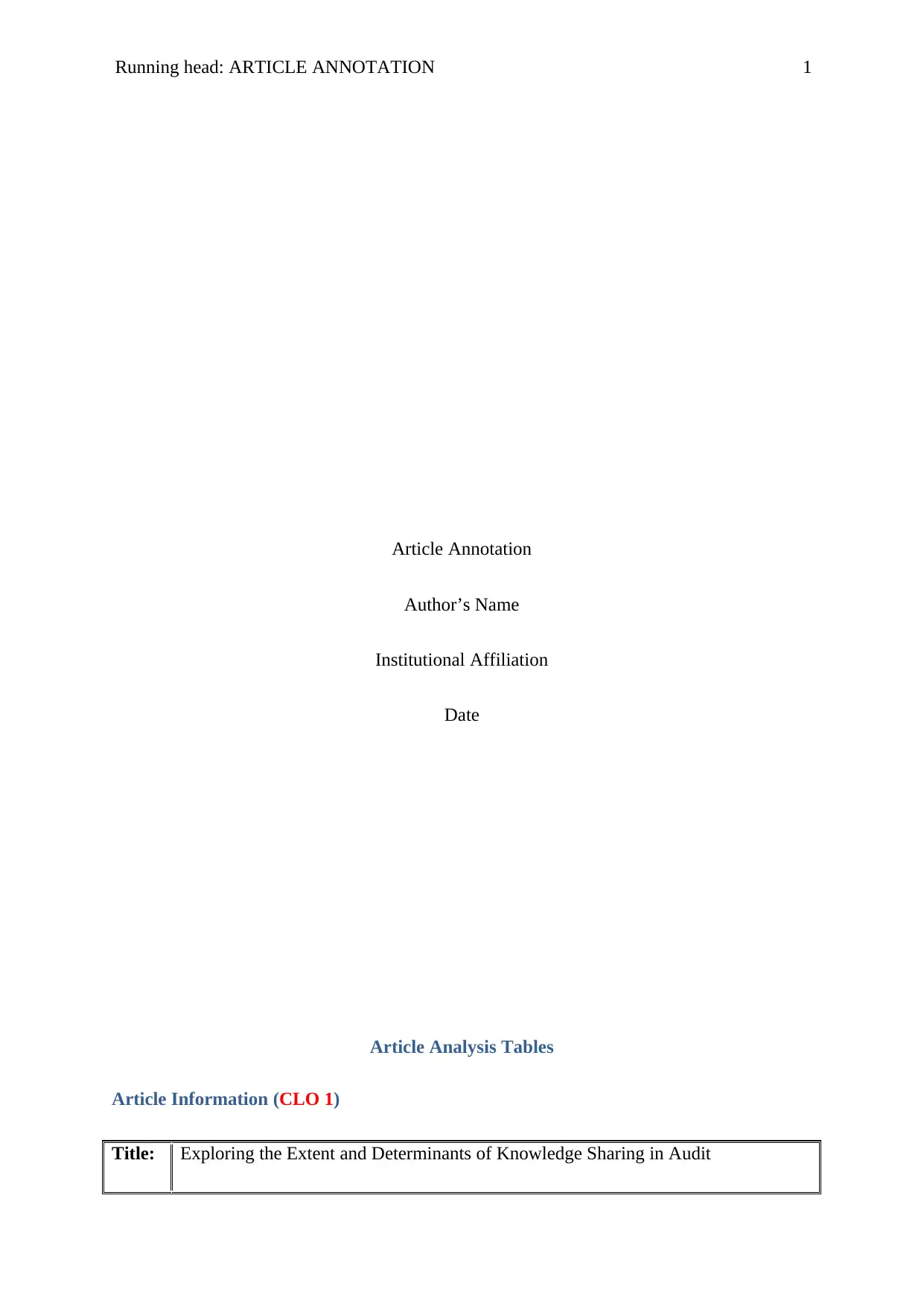
Running head: ARTICLE ANNOTATION 1
Article Annotation
Author’s Name
Institutional Affiliation
Date
Article Analysis Tables
Article Information (CLO 1)
Title: Exploring the Extent and Determinants of Knowledge Sharing in Audit
Article Annotation
Author’s Name
Institutional Affiliation
Date
Article Analysis Tables
Article Information (CLO 1)
Title: Exploring the Extent and Determinants of Knowledge Sharing in Audit
Paraphrase This Document
Need a fresh take? Get an instant paraphrase of this document with our AI Paraphraser
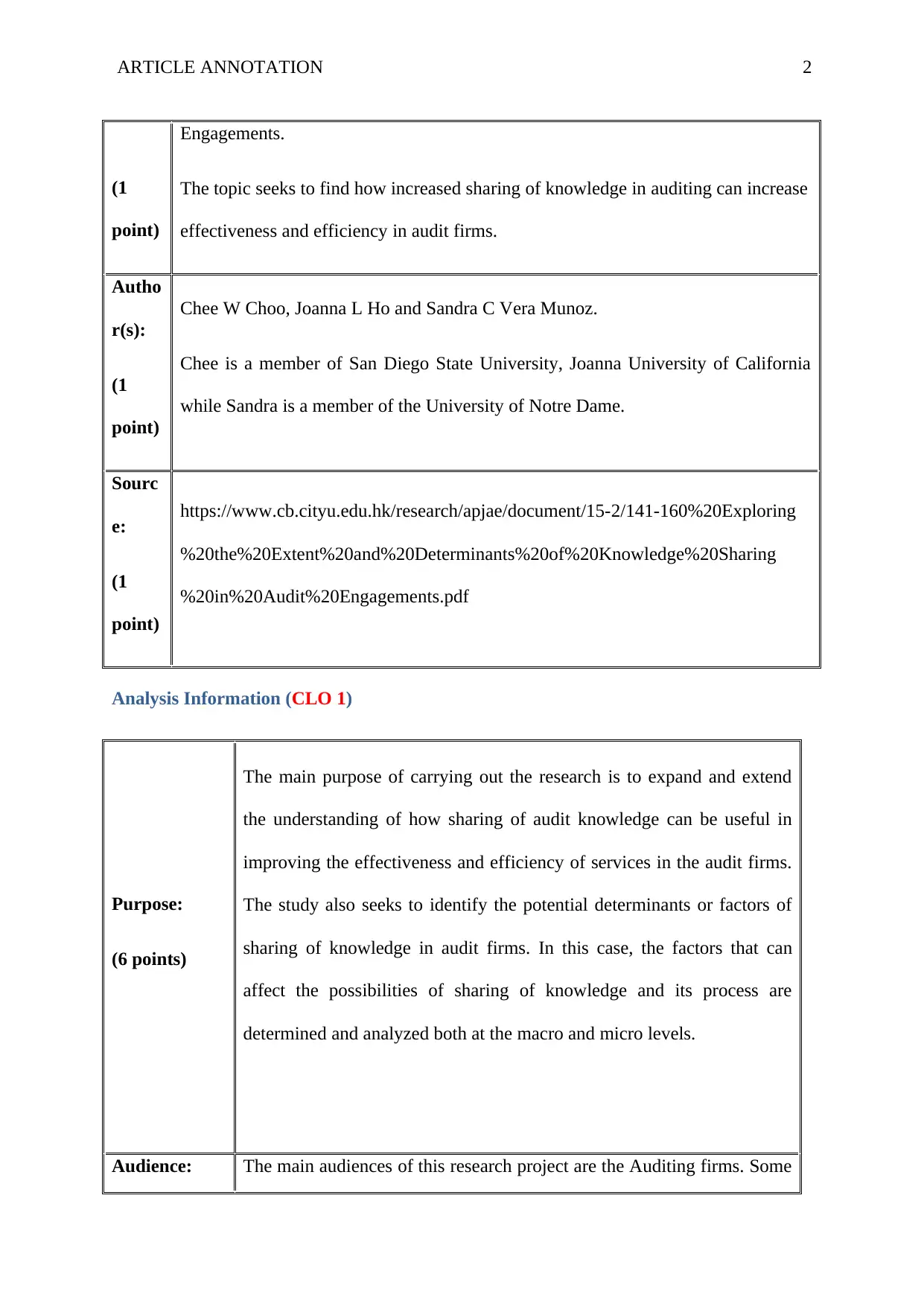
ARTICLE ANNOTATION 2
(1
point)
Engagements.
The topic seeks to find how increased sharing of knowledge in auditing can increase
effectiveness and efficiency in audit firms.
Autho
r(s):
(1
point)
Chee W Choo, Joanna L Ho and Sandra C Vera Munoz.
Chee is a member of San Diego State University, Joanna University of California
while Sandra is a member of the University of Notre Dame.
Sourc
e:
(1
point)
https://www.cb.cityu.edu.hk/research/apjae/document/15-2/141-160%20Exploring
%20the%20Extent%20and%20Determinants%20of%20Knowledge%20Sharing
%20in%20Audit%20Engagements.pdf
Analysis Information (CLO 1)
Purpose:
(6 points)
The main purpose of carrying out the research is to expand and extend
the understanding of how sharing of audit knowledge can be useful in
improving the effectiveness and efficiency of services in the audit firms.
The study also seeks to identify the potential determinants or factors of
sharing of knowledge in audit firms. In this case, the factors that can
affect the possibilities of sharing of knowledge and its process are
determined and analyzed both at the macro and micro levels.
Audience: The main audiences of this research project are the Auditing firms. Some
(1
point)
Engagements.
The topic seeks to find how increased sharing of knowledge in auditing can increase
effectiveness and efficiency in audit firms.
Autho
r(s):
(1
point)
Chee W Choo, Joanna L Ho and Sandra C Vera Munoz.
Chee is a member of San Diego State University, Joanna University of California
while Sandra is a member of the University of Notre Dame.
Sourc
e:
(1
point)
https://www.cb.cityu.edu.hk/research/apjae/document/15-2/141-160%20Exploring
%20the%20Extent%20and%20Determinants%20of%20Knowledge%20Sharing
%20in%20Audit%20Engagements.pdf
Analysis Information (CLO 1)
Purpose:
(6 points)
The main purpose of carrying out the research is to expand and extend
the understanding of how sharing of audit knowledge can be useful in
improving the effectiveness and efficiency of services in the audit firms.
The study also seeks to identify the potential determinants or factors of
sharing of knowledge in audit firms. In this case, the factors that can
affect the possibilities of sharing of knowledge and its process are
determined and analyzed both at the macro and micro levels.
Audience: The main audiences of this research project are the Auditing firms. Some
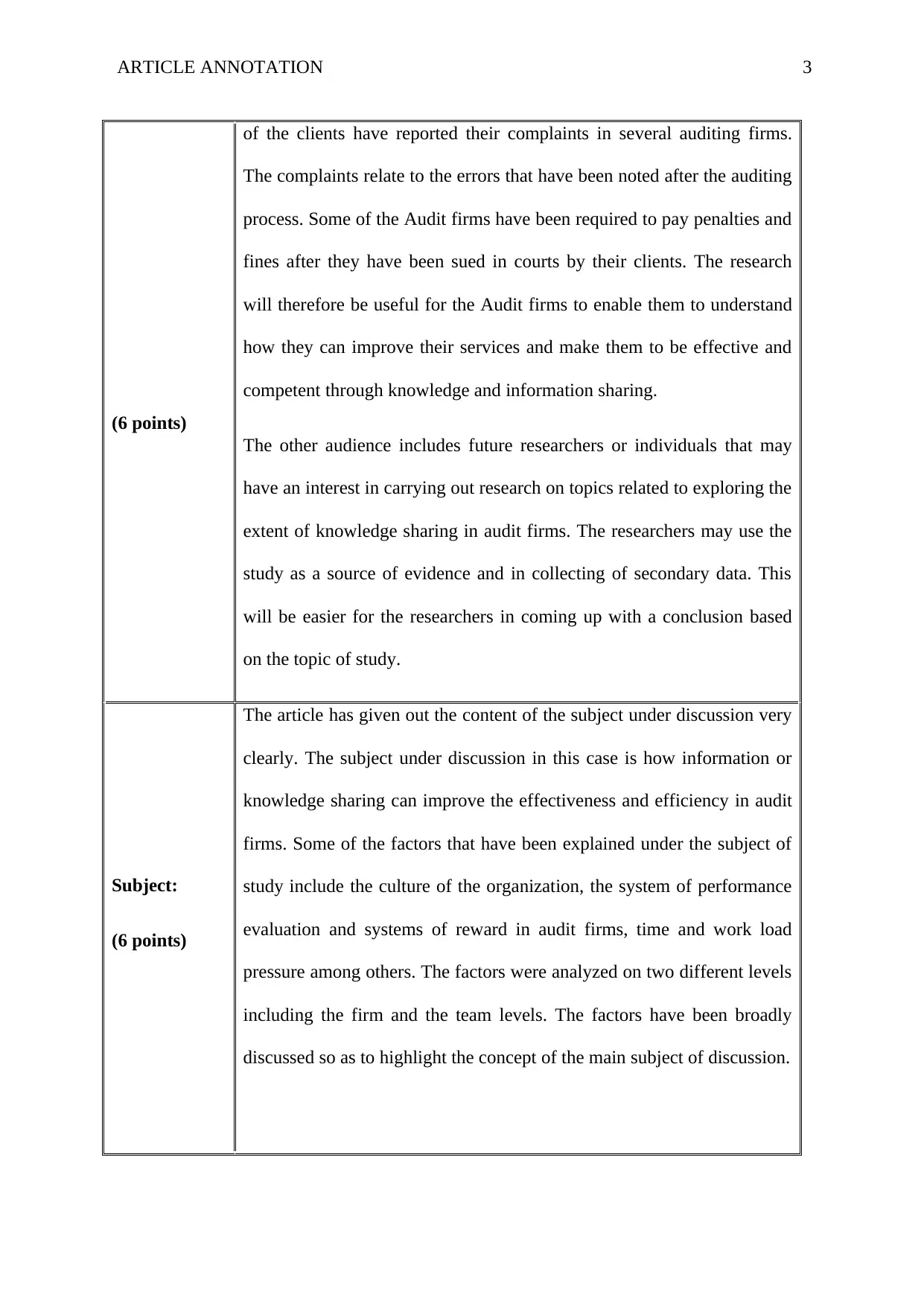
ARTICLE ANNOTATION 3
(6 points)
of the clients have reported their complaints in several auditing firms.
The complaints relate to the errors that have been noted after the auditing
process. Some of the Audit firms have been required to pay penalties and
fines after they have been sued in courts by their clients. The research
will therefore be useful for the Audit firms to enable them to understand
how they can improve their services and make them to be effective and
competent through knowledge and information sharing.
The other audience includes future researchers or individuals that may
have an interest in carrying out research on topics related to exploring the
extent of knowledge sharing in audit firms. The researchers may use the
study as a source of evidence and in collecting of secondary data. This
will be easier for the researchers in coming up with a conclusion based
on the topic of study.
Subject:
(6 points)
The article has given out the content of the subject under discussion very
clearly. The subject under discussion in this case is how information or
knowledge sharing can improve the effectiveness and efficiency in audit
firms. Some of the factors that have been explained under the subject of
study include the culture of the organization, the system of performance
evaluation and systems of reward in audit firms, time and work load
pressure among others. The factors were analyzed on two different levels
including the firm and the team levels. The factors have been broadly
discussed so as to highlight the concept of the main subject of discussion.
(6 points)
of the clients have reported their complaints in several auditing firms.
The complaints relate to the errors that have been noted after the auditing
process. Some of the Audit firms have been required to pay penalties and
fines after they have been sued in courts by their clients. The research
will therefore be useful for the Audit firms to enable them to understand
how they can improve their services and make them to be effective and
competent through knowledge and information sharing.
The other audience includes future researchers or individuals that may
have an interest in carrying out research on topics related to exploring the
extent of knowledge sharing in audit firms. The researchers may use the
study as a source of evidence and in collecting of secondary data. This
will be easier for the researchers in coming up with a conclusion based
on the topic of study.
Subject:
(6 points)
The article has given out the content of the subject under discussion very
clearly. The subject under discussion in this case is how information or
knowledge sharing can improve the effectiveness and efficiency in audit
firms. Some of the factors that have been explained under the subject of
study include the culture of the organization, the system of performance
evaluation and systems of reward in audit firms, time and work load
pressure among others. The factors were analyzed on two different levels
including the firm and the team levels. The factors have been broadly
discussed so as to highlight the concept of the main subject of discussion.
⊘ This is a preview!⊘
Do you want full access?
Subscribe today to unlock all pages.

Trusted by 1+ million students worldwide
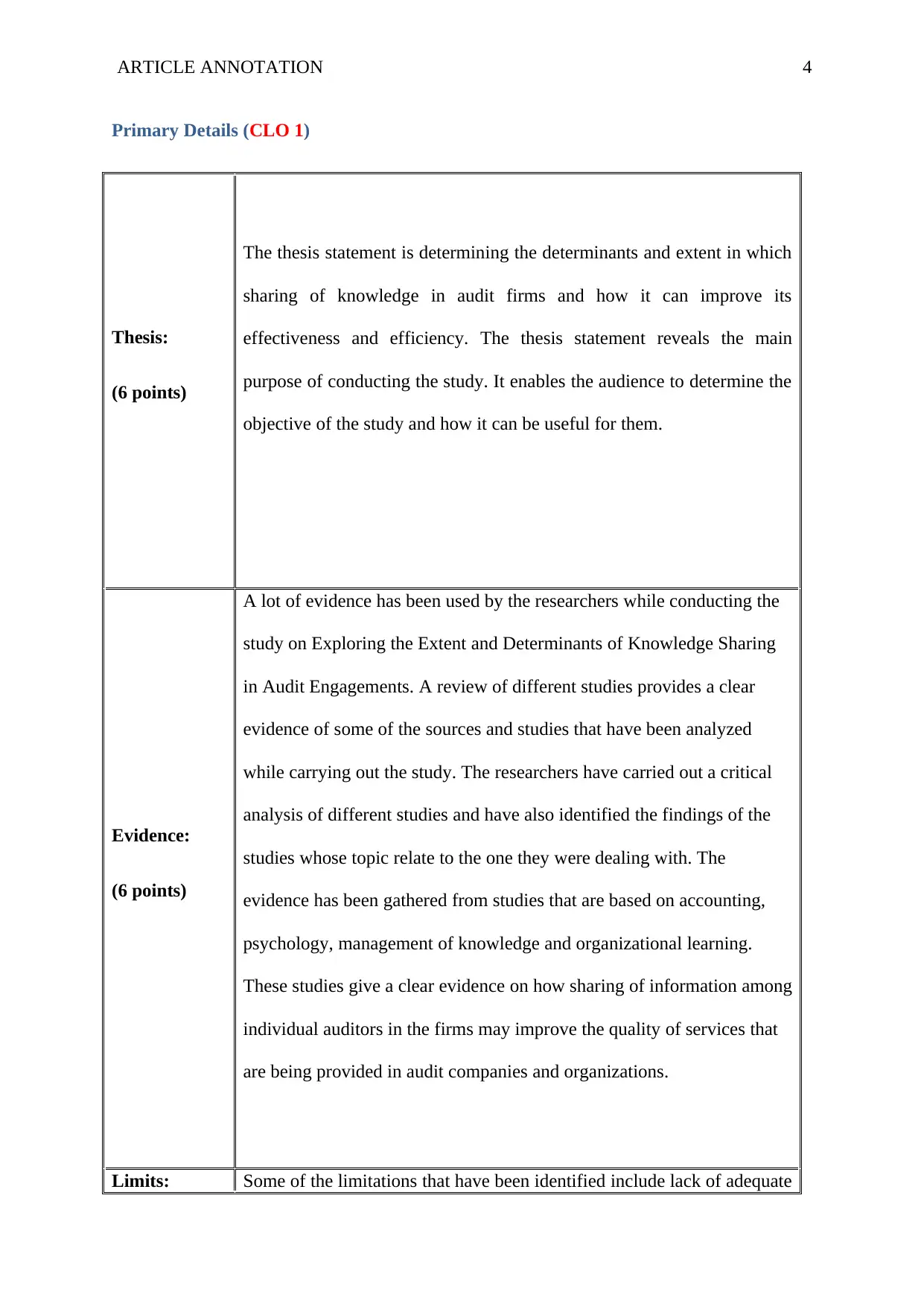
ARTICLE ANNOTATION 4
Primary Details (CLO 1)
Thesis:
(6 points)
The thesis statement is determining the determinants and extent in which
sharing of knowledge in audit firms and how it can improve its
effectiveness and efficiency. The thesis statement reveals the main
purpose of conducting the study. It enables the audience to determine the
objective of the study and how it can be useful for them.
Evidence:
(6 points)
A lot of evidence has been used by the researchers while conducting the
study on Exploring the Extent and Determinants of Knowledge Sharing
in Audit Engagements. A review of different studies provides a clear
evidence of some of the sources and studies that have been analyzed
while carrying out the study. The researchers have carried out a critical
analysis of different studies and have also identified the findings of the
studies whose topic relate to the one they were dealing with. The
evidence has been gathered from studies that are based on accounting,
psychology, management of knowledge and organizational learning.
These studies give a clear evidence on how sharing of information among
individual auditors in the firms may improve the quality of services that
are being provided in audit companies and organizations.
Limits: Some of the limitations that have been identified include lack of adequate
Primary Details (CLO 1)
Thesis:
(6 points)
The thesis statement is determining the determinants and extent in which
sharing of knowledge in audit firms and how it can improve its
effectiveness and efficiency. The thesis statement reveals the main
purpose of conducting the study. It enables the audience to determine the
objective of the study and how it can be useful for them.
Evidence:
(6 points)
A lot of evidence has been used by the researchers while conducting the
study on Exploring the Extent and Determinants of Knowledge Sharing
in Audit Engagements. A review of different studies provides a clear
evidence of some of the sources and studies that have been analyzed
while carrying out the study. The researchers have carried out a critical
analysis of different studies and have also identified the findings of the
studies whose topic relate to the one they were dealing with. The
evidence has been gathered from studies that are based on accounting,
psychology, management of knowledge and organizational learning.
These studies give a clear evidence on how sharing of information among
individual auditors in the firms may improve the quality of services that
are being provided in audit companies and organizations.
Limits: Some of the limitations that have been identified include lack of adequate
Paraphrase This Document
Need a fresh take? Get an instant paraphrase of this document with our AI Paraphraser
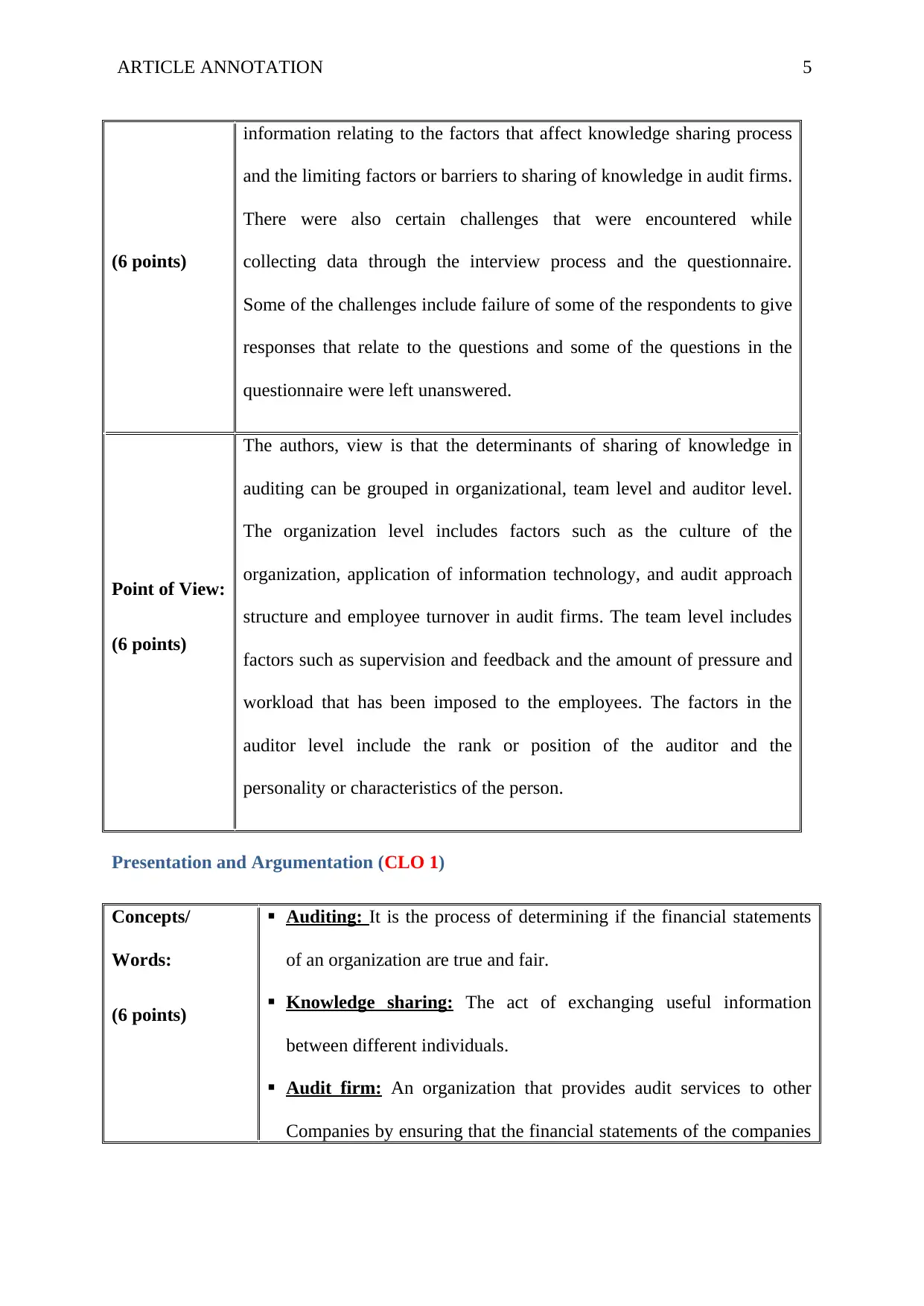
ARTICLE ANNOTATION 5
(6 points)
information relating to the factors that affect knowledge sharing process
and the limiting factors or barriers to sharing of knowledge in audit firms.
There were also certain challenges that were encountered while
collecting data through the interview process and the questionnaire.
Some of the challenges include failure of some of the respondents to give
responses that relate to the questions and some of the questions in the
questionnaire were left unanswered.
Point of View:
(6 points)
The authors, view is that the determinants of sharing of knowledge in
auditing can be grouped in organizational, team level and auditor level.
The organization level includes factors such as the culture of the
organization, application of information technology, and audit approach
structure and employee turnover in audit firms. The team level includes
factors such as supervision and feedback and the amount of pressure and
workload that has been imposed to the employees. The factors in the
auditor level include the rank or position of the auditor and the
personality or characteristics of the person.
Presentation and Argumentation (CLO 1)
Concepts/
Words:
(6 points)
Auditing: It is the process of determining if the financial statements
of an organization are true and fair.
Knowledge sharing: The act of exchanging useful information
between different individuals.
Audit firm: An organization that provides audit services to other
Companies by ensuring that the financial statements of the companies
(6 points)
information relating to the factors that affect knowledge sharing process
and the limiting factors or barriers to sharing of knowledge in audit firms.
There were also certain challenges that were encountered while
collecting data through the interview process and the questionnaire.
Some of the challenges include failure of some of the respondents to give
responses that relate to the questions and some of the questions in the
questionnaire were left unanswered.
Point of View:
(6 points)
The authors, view is that the determinants of sharing of knowledge in
auditing can be grouped in organizational, team level and auditor level.
The organization level includes factors such as the culture of the
organization, application of information technology, and audit approach
structure and employee turnover in audit firms. The team level includes
factors such as supervision and feedback and the amount of pressure and
workload that has been imposed to the employees. The factors in the
auditor level include the rank or position of the auditor and the
personality or characteristics of the person.
Presentation and Argumentation (CLO 1)
Concepts/
Words:
(6 points)
Auditing: It is the process of determining if the financial statements
of an organization are true and fair.
Knowledge sharing: The act of exchanging useful information
between different individuals.
Audit firm: An organization that provides audit services to other
Companies by ensuring that the financial statements of the companies
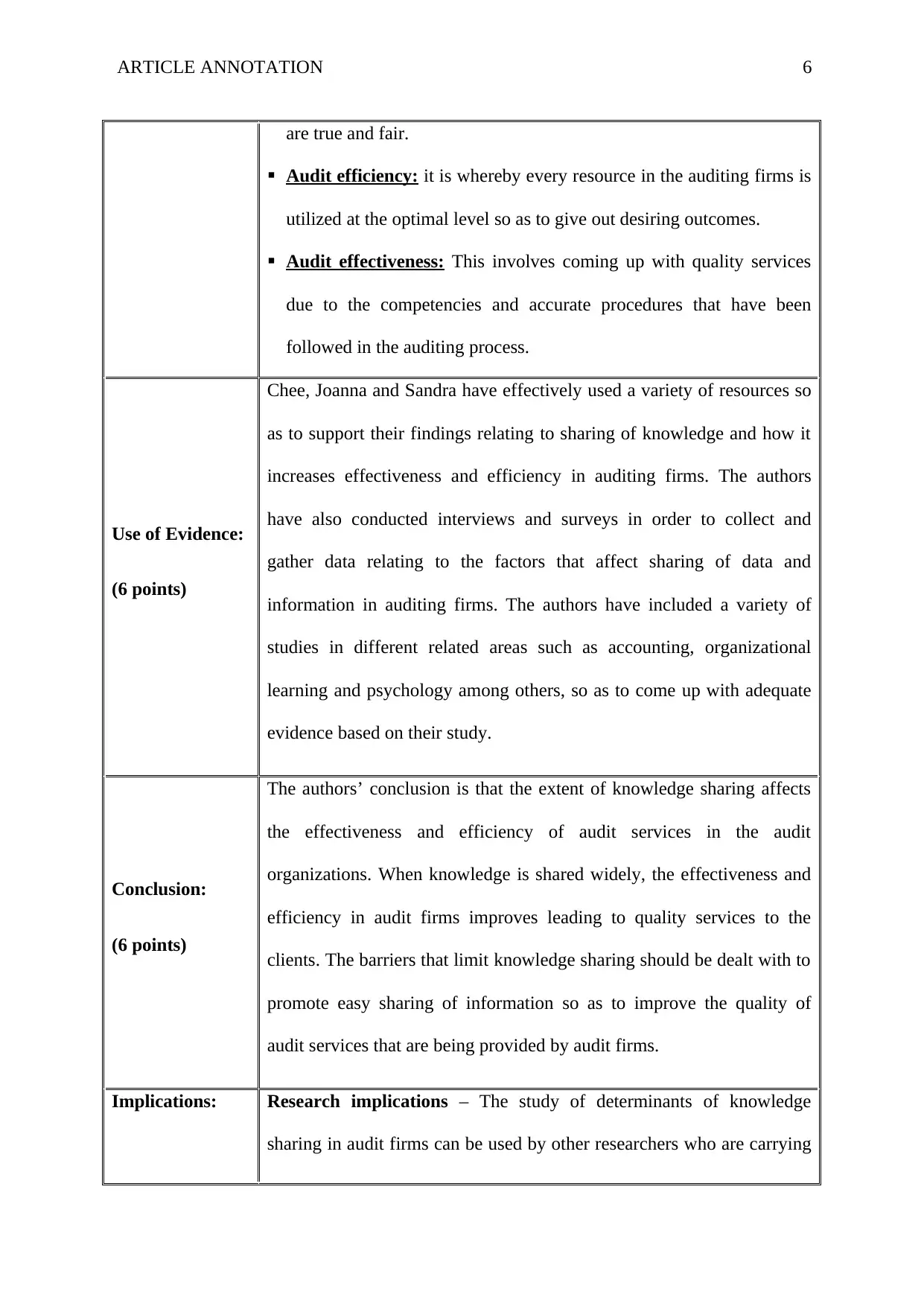
ARTICLE ANNOTATION 6
are true and fair.
Audit efficiency: it is whereby every resource in the auditing firms is
utilized at the optimal level so as to give out desiring outcomes.
Audit effectiveness: This involves coming up with quality services
due to the competencies and accurate procedures that have been
followed in the auditing process.
Use of Evidence:
(6 points)
Chee, Joanna and Sandra have effectively used a variety of resources so
as to support their findings relating to sharing of knowledge and how it
increases effectiveness and efficiency in auditing firms. The authors
have also conducted interviews and surveys in order to collect and
gather data relating to the factors that affect sharing of data and
information in auditing firms. The authors have included a variety of
studies in different related areas such as accounting, organizational
learning and psychology among others, so as to come up with adequate
evidence based on their study.
Conclusion:
(6 points)
The authors’ conclusion is that the extent of knowledge sharing affects
the effectiveness and efficiency of audit services in the audit
organizations. When knowledge is shared widely, the effectiveness and
efficiency in audit firms improves leading to quality services to the
clients. The barriers that limit knowledge sharing should be dealt with to
promote easy sharing of information so as to improve the quality of
audit services that are being provided by audit firms.
Implications: Research implications – The study of determinants of knowledge
sharing in audit firms can be used by other researchers who are carrying
are true and fair.
Audit efficiency: it is whereby every resource in the auditing firms is
utilized at the optimal level so as to give out desiring outcomes.
Audit effectiveness: This involves coming up with quality services
due to the competencies and accurate procedures that have been
followed in the auditing process.
Use of Evidence:
(6 points)
Chee, Joanna and Sandra have effectively used a variety of resources so
as to support their findings relating to sharing of knowledge and how it
increases effectiveness and efficiency in auditing firms. The authors
have also conducted interviews and surveys in order to collect and
gather data relating to the factors that affect sharing of data and
information in auditing firms. The authors have included a variety of
studies in different related areas such as accounting, organizational
learning and psychology among others, so as to come up with adequate
evidence based on their study.
Conclusion:
(6 points)
The authors’ conclusion is that the extent of knowledge sharing affects
the effectiveness and efficiency of audit services in the audit
organizations. When knowledge is shared widely, the effectiveness and
efficiency in audit firms improves leading to quality services to the
clients. The barriers that limit knowledge sharing should be dealt with to
promote easy sharing of information so as to improve the quality of
audit services that are being provided by audit firms.
Implications: Research implications – The study of determinants of knowledge
sharing in audit firms can be used by other researchers who are carrying
⊘ This is a preview!⊘
Do you want full access?
Subscribe today to unlock all pages.

Trusted by 1+ million students worldwide
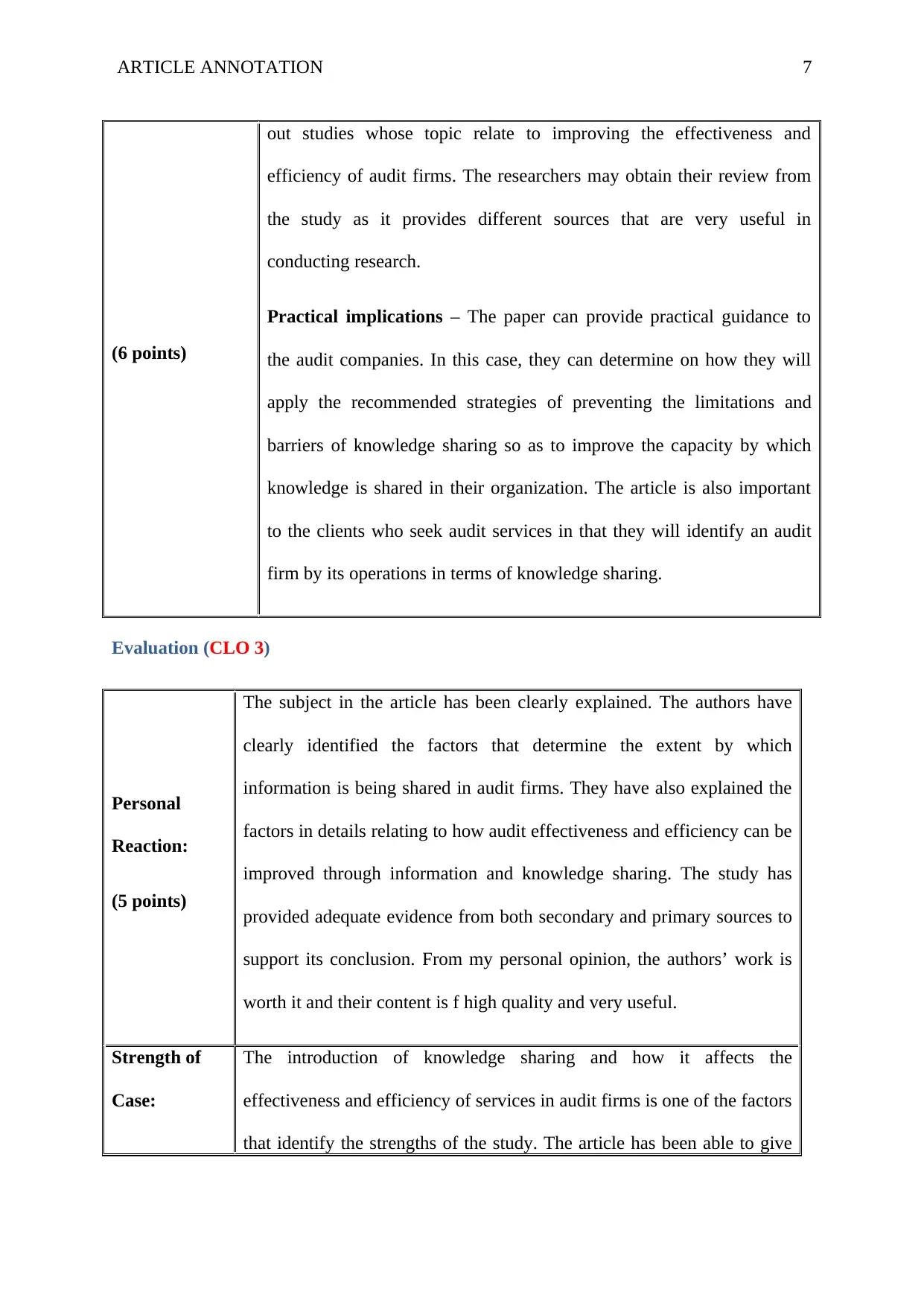
ARTICLE ANNOTATION 7
(6 points)
out studies whose topic relate to improving the effectiveness and
efficiency of audit firms. The researchers may obtain their review from
the study as it provides different sources that are very useful in
conducting research.
Practical implications – The paper can provide practical guidance to
the audit companies. In this case, they can determine on how they will
apply the recommended strategies of preventing the limitations and
barriers of knowledge sharing so as to improve the capacity by which
knowledge is shared in their organization. The article is also important
to the clients who seek audit services in that they will identify an audit
firm by its operations in terms of knowledge sharing.
Evaluation (CLO 3)
Personal
Reaction:
(5 points)
The subject in the article has been clearly explained. The authors have
clearly identified the factors that determine the extent by which
information is being shared in audit firms. They have also explained the
factors in details relating to how audit effectiveness and efficiency can be
improved through information and knowledge sharing. The study has
provided adequate evidence from both secondary and primary sources to
support its conclusion. From my personal opinion, the authors’ work is
worth it and their content is f high quality and very useful.
Strength of
Case:
The introduction of knowledge sharing and how it affects the
effectiveness and efficiency of services in audit firms is one of the factors
that identify the strengths of the study. The article has been able to give
(6 points)
out studies whose topic relate to improving the effectiveness and
efficiency of audit firms. The researchers may obtain their review from
the study as it provides different sources that are very useful in
conducting research.
Practical implications – The paper can provide practical guidance to
the audit companies. In this case, they can determine on how they will
apply the recommended strategies of preventing the limitations and
barriers of knowledge sharing so as to improve the capacity by which
knowledge is shared in their organization. The article is also important
to the clients who seek audit services in that they will identify an audit
firm by its operations in terms of knowledge sharing.
Evaluation (CLO 3)
Personal
Reaction:
(5 points)
The subject in the article has been clearly explained. The authors have
clearly identified the factors that determine the extent by which
information is being shared in audit firms. They have also explained the
factors in details relating to how audit effectiveness and efficiency can be
improved through information and knowledge sharing. The study has
provided adequate evidence from both secondary and primary sources to
support its conclusion. From my personal opinion, the authors’ work is
worth it and their content is f high quality and very useful.
Strength of
Case:
The introduction of knowledge sharing and how it affects the
effectiveness and efficiency of services in audit firms is one of the factors
that identify the strengths of the study. The article has been able to give
Paraphrase This Document
Need a fresh take? Get an instant paraphrase of this document with our AI Paraphraser
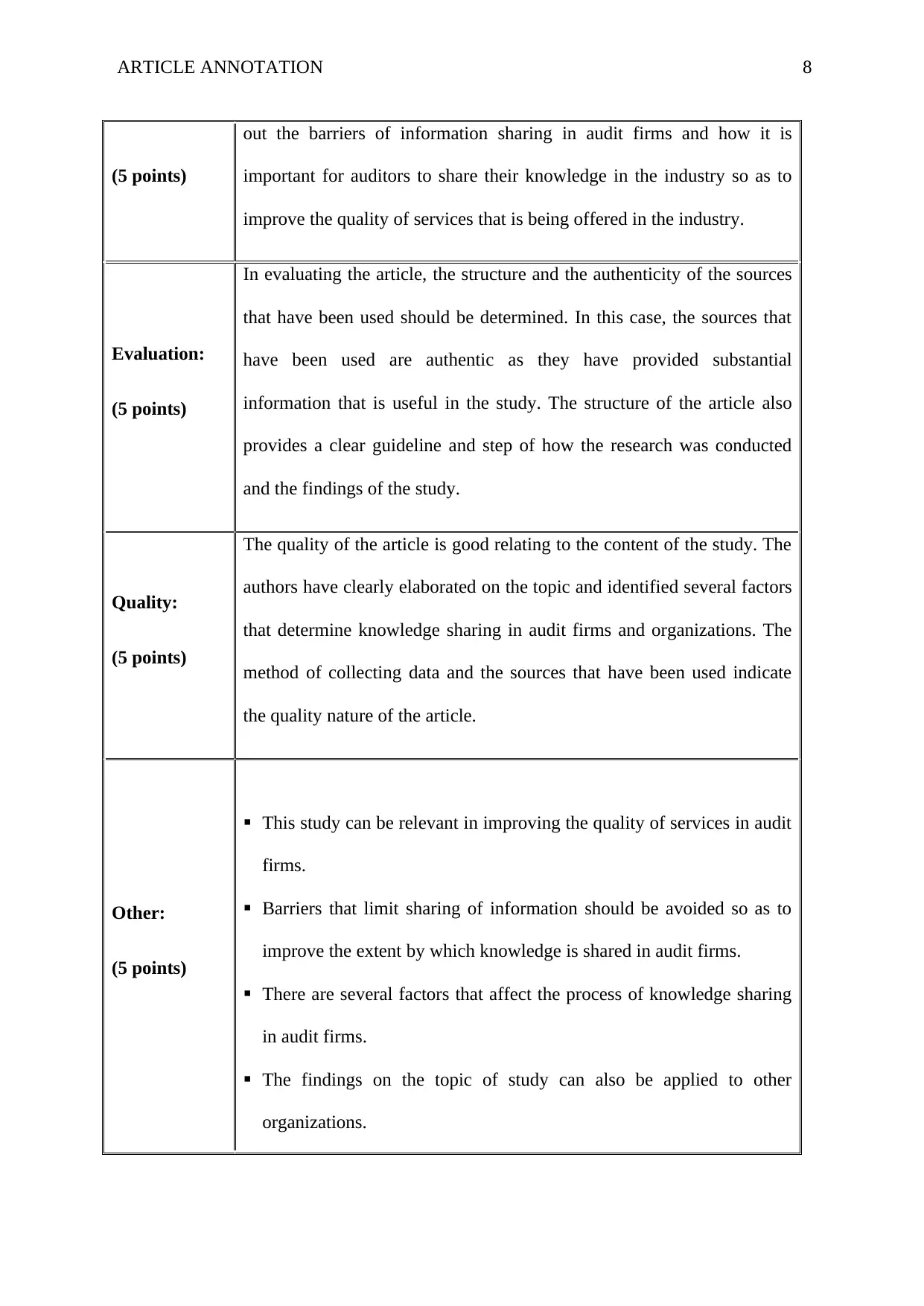
ARTICLE ANNOTATION 8
(5 points)
out the barriers of information sharing in audit firms and how it is
important for auditors to share their knowledge in the industry so as to
improve the quality of services that is being offered in the industry.
Evaluation:
(5 points)
In evaluating the article, the structure and the authenticity of the sources
that have been used should be determined. In this case, the sources that
have been used are authentic as they have provided substantial
information that is useful in the study. The structure of the article also
provides a clear guideline and step of how the research was conducted
and the findings of the study.
Quality:
(5 points)
The quality of the article is good relating to the content of the study. The
authors have clearly elaborated on the topic and identified several factors
that determine knowledge sharing in audit firms and organizations. The
method of collecting data and the sources that have been used indicate
the quality nature of the article.
Other:
(5 points)
This study can be relevant in improving the quality of services in audit
firms.
Barriers that limit sharing of information should be avoided so as to
improve the extent by which knowledge is shared in audit firms.
There are several factors that affect the process of knowledge sharing
in audit firms.
The findings on the topic of study can also be applied to other
organizations.
(5 points)
out the barriers of information sharing in audit firms and how it is
important for auditors to share their knowledge in the industry so as to
improve the quality of services that is being offered in the industry.
Evaluation:
(5 points)
In evaluating the article, the structure and the authenticity of the sources
that have been used should be determined. In this case, the sources that
have been used are authentic as they have provided substantial
information that is useful in the study. The structure of the article also
provides a clear guideline and step of how the research was conducted
and the findings of the study.
Quality:
(5 points)
The quality of the article is good relating to the content of the study. The
authors have clearly elaborated on the topic and identified several factors
that determine knowledge sharing in audit firms and organizations. The
method of collecting data and the sources that have been used indicate
the quality nature of the article.
Other:
(5 points)
This study can be relevant in improving the quality of services in audit
firms.
Barriers that limit sharing of information should be avoided so as to
improve the extent by which knowledge is shared in audit firms.
There are several factors that affect the process of knowledge sharing
in audit firms.
The findings on the topic of study can also be applied to other
organizations.
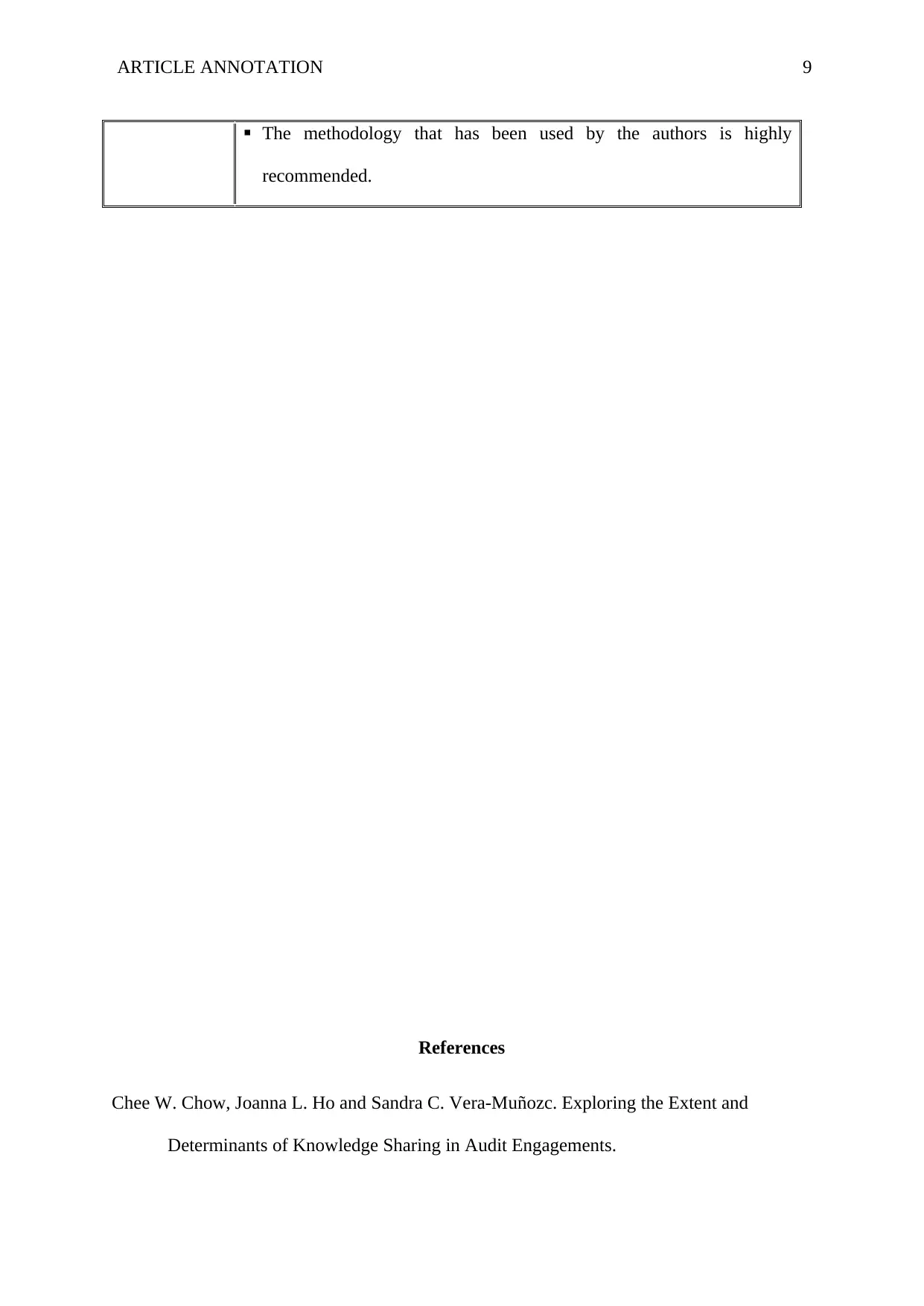
ARTICLE ANNOTATION 9
The methodology that has been used by the authors is highly
recommended.
References
Chee W. Chow, Joanna L. Ho and Sandra C. Vera-Muñozc. Exploring the Extent and
Determinants of Knowledge Sharing in Audit Engagements.
The methodology that has been used by the authors is highly
recommended.
References
Chee W. Chow, Joanna L. Ho and Sandra C. Vera-Muñozc. Exploring the Extent and
Determinants of Knowledge Sharing in Audit Engagements.
⊘ This is a preview!⊘
Do you want full access?
Subscribe today to unlock all pages.

Trusted by 1+ million students worldwide
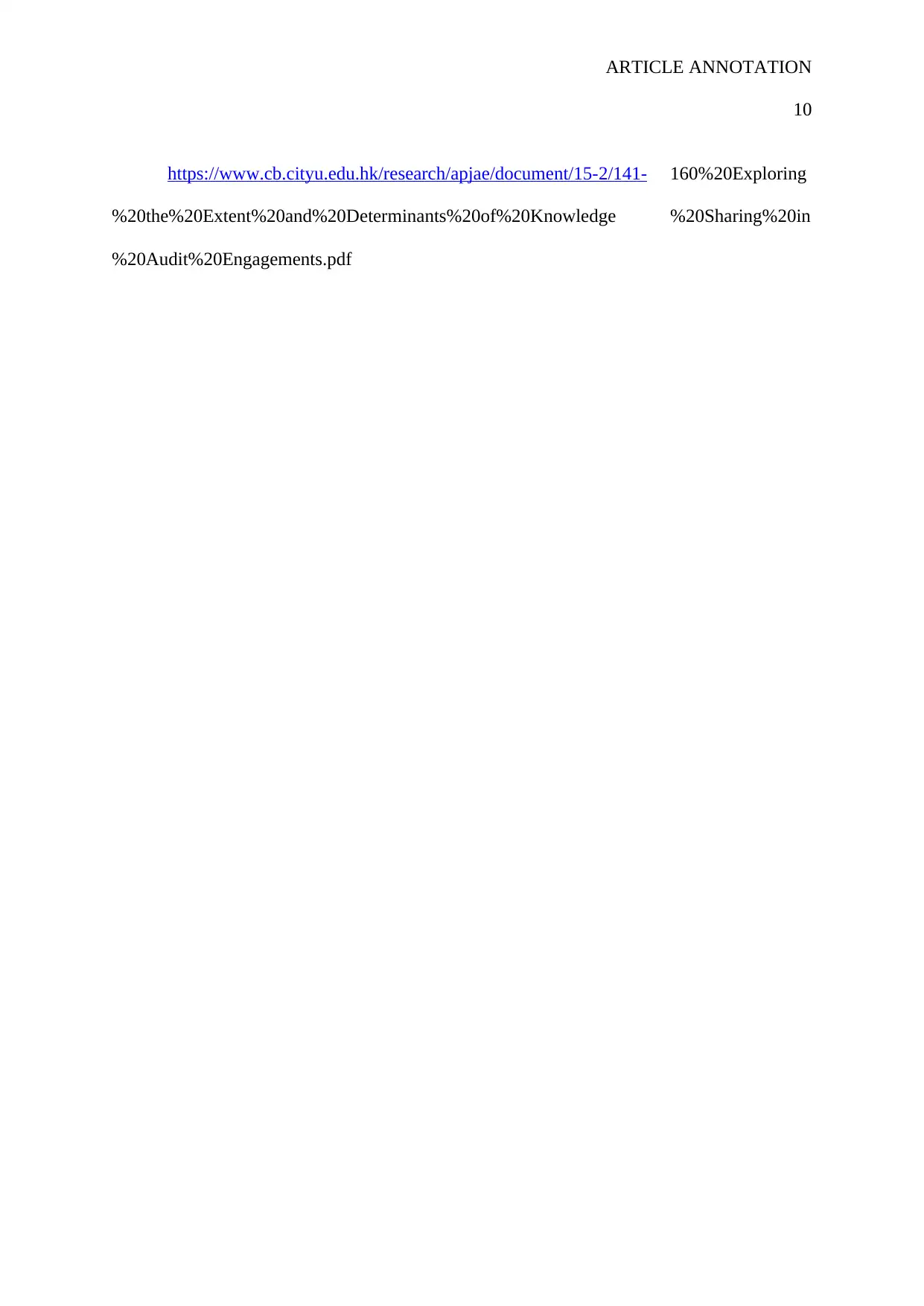
ARTICLE ANNOTATION
10
https://www.cb.cityu.edu.hk/research/apjae/document/15-2/141- 160%20Exploring
%20the%20Extent%20and%20Determinants%20of%20Knowledge %20Sharing%20in
%20Audit%20Engagements.pdf
10
https://www.cb.cityu.edu.hk/research/apjae/document/15-2/141- 160%20Exploring
%20the%20Extent%20and%20Determinants%20of%20Knowledge %20Sharing%20in
%20Audit%20Engagements.pdf
1 out of 10
Related Documents
Your All-in-One AI-Powered Toolkit for Academic Success.
+13062052269
info@desklib.com
Available 24*7 on WhatsApp / Email
![[object Object]](/_next/static/media/star-bottom.7253800d.svg)
Unlock your academic potential
Copyright © 2020–2026 A2Z Services. All Rights Reserved. Developed and managed by ZUCOL.





